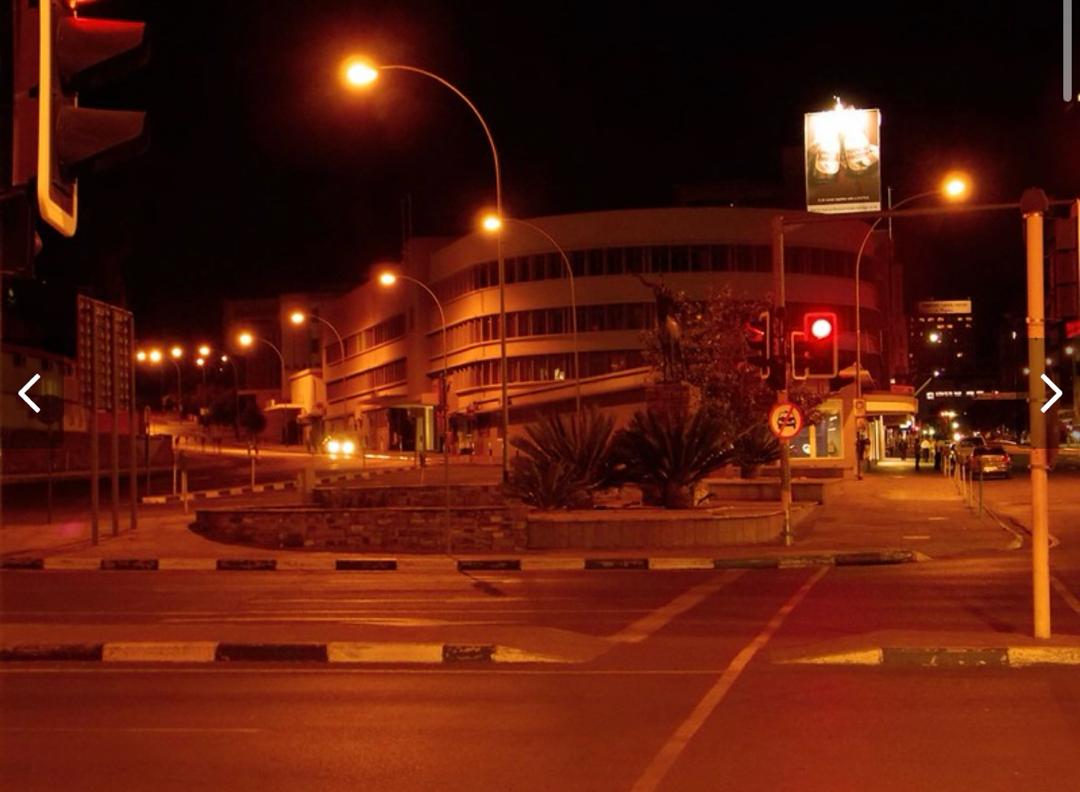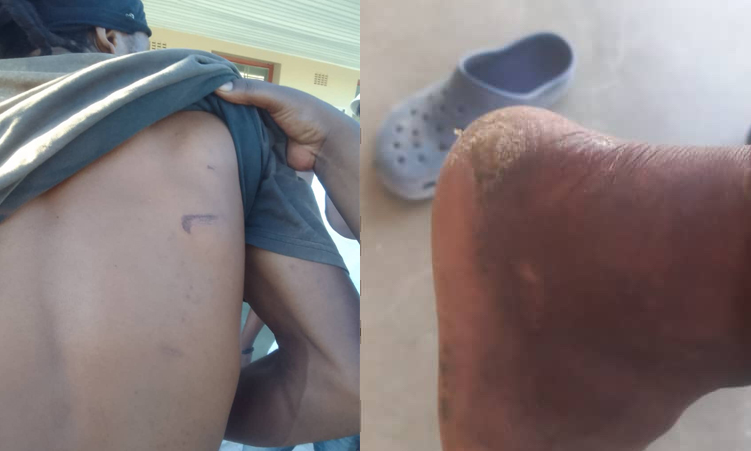THE suspect accused of murdering an Okahandja resident who was found strangled in his home in early 2005 pleaded guilty to a charge of murder in the Windhoek Regional Court this week.
Michael Kalola (32) faces charges of murder and robbery with aggravating circumstances in his trial that started before Magistrate Dinnah Usiku on Monday. He is accused of murdering a 41-year-old Okahandja resident, Carl Aron Carstens, in Carstens’s home at Okahandja on February 16 2005.Carstens was allegedly strangled with a piece of electrical wire.Kalola is further accused of stealing a range of items – including a cellphone, a videocassette recorder, a radio, four silver necklaces, four pairs of golden earrings, and 12 tubes of lipstick – after forcing Carstens into submission by strangling him.In a plea explanation that defence lawyer Profysen Muluti submitted to Magistrate Usiku on his client’s behalf, Kalola said he “unequivocally” admitted to killing Carstens by strangling him.”I further admit that I knew the above conduct constituted an offence for which, upon conviction, I could be punished,” he stated in the plea explanation.He added that his acts were “regrettable” and that he was pleading for mercy from the court when he is to be sentenced.Muluti also told the Magistrate that Kalola was admitting that he had taken the items listed in the robbery charge from Carstens’s house without the owner’s permission.Kalola however is denying that he strangled Carstens with the intention of robbing him, Muluti said.Carstens was found lying dead in a bathroom in his house, with a cable tied around his neck, shortly after 17h00 on the day of the incident, his brother, Johan Carstens, told the Magistrate on Monday.According to Johan Carstens and the Police officer who investigated the case, Detective Warrant Officer Reinhardt Maletzky, who also visited the crime scene on the afternoon of February 16 2005, Carstens was wearing a dress when he was found.”He was wearing a red dress,” Maletzky told the Magistrate on a question from Muluti.Carstens was a man who lived as a woman.That just was how he wanted to be, Johan Carstens told the Magistrate after a further question from the defence lawyer on the clothing his brother was found dressed in.In a report on a post-mortem examination that was done on Carstens it was recorded that he was wearing a red floral dress, a black camisole, a black petticoat, two panties and a black bra stuffed with rolled-up pantyhose.”Findings consistent with asphyxia” is stated as the cause of his death.Carstens’s house was found in disorder, with pieces of broken glass lying in parts of the house, Maletzky testified.He said from the state that the house was in, it could be seen that Carstens and the person who had killed him had been in “a huge fight”.When he cross-examined the detective, Muluti told Maletzky his instructions from Kalola are that Kalola and Carstens had a relationship, that Carstens invited Kalola to his house, and that a fight broke out between them when Carstens wanted to commit a sexual act with Kalola.Maletzky replied that he could not comment on that, as he had not been at the house when the incident took place.He was however adamant that it was clear – from the state of the house and the way that Carstens had been killed – that force had been used to murder Carstens, and that he was robbed after violence had been used against him.Muluti further put it to Johan Carstens that his instructions are that after killing Carstens, Kalola decided to remove things from the house, because Carstens had owed him N$400 and was refusing to give the money to him.Kalola was arrested about a week after the incident.He was arrested in northern Namibia after the Police had first recovered the cellphone that was stolen from Carstens’s house and then traced Kalola through the cellphone, Maletzky testified.He said Kalola was found with “a lot” of the goods that is alleged to have been stolen from Carstens, while Kalola also directed the Police to other people to whom he had sold some of the goods.Kalola told the Police that he “did commit the crime”, and he gave his full cooperation during the investigation of the case, Maletzky said.Public Prosecutor Karin Esterhuizen closed the case for the State after presenting the testimony of Johan Carstens and Maletzky to the court.The trial is scheduled to continue on February 7.Kalola remains in custody.He is accused of murdering a 41-year-old Okahandja resident, Carl Aron Carstens, in Carstens’s home at Okahandja on February 16 2005.Carstens was allegedly strangled with a piece of electrical wire.Kalola is further accused of stealing a range of items – including a cellphone, a videocassette recorder, a radio, four silver necklaces, four pairs of golden earrings, and 12 tubes of lipstick – after forcing Carstens into submission by strangling him.In a plea explanation that defence lawyer Profysen Muluti submitted to Magistrate Usiku on his client’s behalf, Kalola said he “unequivocally” admitted to killing Carstens by strangling him.”I further admit that I knew the above conduct constituted an offence for which, upon conviction, I could be punished,” he stated in the plea explanation.He added that his acts were “regrettable” and that he was pleading for mercy from the court when he is to be sentenced.Muluti also told the Magistrate that Kalola was admitting that he had taken the items listed in the robbery charge from Carstens’s house without the owner’s permission.Kalola however is denying that he strangled Carstens with the intention of robbing him, Muluti said.Carstens was found lying dead in a bathroom in his house, with a cable tied around his neck, shortly after 17h00 on the day of the incident, his brother, Johan Carstens, told the Magistrate on Monday.According to Johan Carstens and the Police officer who investigated the case, Detective Warrant Officer Reinhardt Maletzky, who also visited the crime scene on the afternoon of February 16 2005, Carstens was wearing a dress when he was found.”He was wearing a red dress,” Maletzky told the Magistrate on a question from Muluti.Carstens was a man who lived as a woman.That just was how he wanted to be, Johan Carstens told the Magistrate after a further question from the defence lawyer on the clothing his brother was found dressed in.In a report on a post-mortem examination that was done on Carstens it was recorded that he was wearing a red floral dress, a black camisole, a black petticoat, two panties and a black bra stuffed with rolled-up pantyhose.”Findings consistent with asphyxia” is stated as the cause of his death.Carstens’s house was found in disorder, with pieces of broken glass lying in parts of the house, Maletzky testified.He said from the state that the house was in, it could be seen that Carstens and the person who had killed him had been in “a huge fight”.When he cross-examined the detective, Muluti told Maletzky his instructions from Kalola are that Kalola and Carstens had a relationship, that Carstens invited Kalola to his house, and that a fight broke out between them when Carstens wanted to commit a sexual act with Kalola.Maletzky replied that he could not comment on that, as he had not been at the house when the incident took place.He was however adamant that it was clear – from the state of the house and the way that Carstens had been killed – that force had been used to murder Carstens, and that he was robbed after violence had been used against him.Muluti further put it to Johan Carstens that his instructions are that after killing Carstens, Kalola decided to remove things from the house, because Carstens had owed him N$400 and was refusing to give the money to him.Kalola was arrested about a week after the incident.He was arrested in northern Namibia after the Police had first recovered the cellphone that was stolen from Carstens’s house and then traced Kalola through the cellphone, Maletzky testified.He said Kalola was found with “a lot” of the goods that is alleged to have been stolen from Carstens, while Kalola also directed the Police to other people to whom he had sold some of the goods.Kalola told the Police that he “did commit the crime”, and he gave his full cooperation during the investigation of the case, Maletzky said.Public Prosecutor Karin Esterhuizen closed the case for the State after presenting the testimony of Johan Carstens and Maletzky to the court.The trial is scheduled to continue on February 7.Kalola remains in custody.
Stay informed with The Namibian – your source for credible journalism. Get in-depth reporting and opinions for
only N$85 a month. Invest in journalism, invest in democracy –
Subscribe Now!










